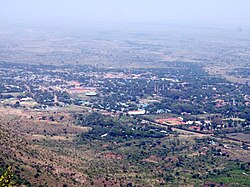Moroto District
Moroto District | |
|---|---|
 | |
 District location in Uganda | |
| Coordinates: 02°32′N 34°40′E / 2.533°N 34.667°E | |
| Country | |
| Region | Northern Region of Uganda |
| Sub-region | Karamoja sub-region |
| Capital | Moroto |
| Area | |
• Total | 3,537.6 km2 (1,365.9 sq mi) |
| Population (2014 census) | |
• Total | 103,432[1] |
| Time zone | UTC+3 (EAT) |
| Website | www |


Moroto District is a district in the Northern Region of Uganda. The town of Moroto is the site of the district headquarters.[2]

Location
[edit]Moroto District is bordered by Kaabong District to the north, Kenya to the east, Amudat District to the south, Nakapiripirit District to the southwest, Napak District to the west, and Kotido District to the northwest. Moroto Town, where the district headquarters, is at the foot of Mt. Moroto.[3] The town of Moroto is 213 kilometres (132 mi), by road, northeast of Mbale, the nearest large city.[4] It lies about 434 kilometres (270 mi) northeast of Kampala, the capital and largest city of Uganda.[5]
Overview
[edit]Moroto District is part of the larger Karamoja sub-region. Moroto District is "characterized by rocky mountainous landscape with moderately low rainfall".[6]
It is composed of three counties: Bokora County, Matheniko County, and Moroto Municipality. It is inhabited by the Karimojong, a distinctive ethnic group that highly cherishes its traditions.[7]
The district is a hub of mineral resources that are yet to be optimally exploited. There are over fifty different minerals and precious stones in the Karamoja region. Of these, Moroto has gold, silver, copper, iron, titanium, manganese, niobium, tantalite, and chrome. Other proven minerals include marble, mica, garnets, limestone, and asbestos.[8][9]
Population
[edit]In 1991, the national census enumerated the district population at 59,149. The 2002 national census enumerated the population at 77,243. In August 2014, the national census and household survey enumerated the population at 103,432.[1]
References
[edit]- ^ a b c UBOS (November 2014). "The Population of Moroto District In 1991, 2002 and 2014". Citypopulation.de Quoting Uganda Bureau of Statistics (UBOS). Retrieved 9 August 2017.
- ^ Ariko, Charles (9 August 2006). "Moroto District to get power, says Migereko". New Vision. Kampala. Retrieved 9 August 2017.
- ^ "Map of Moroto District Showing Mount Moroto and Moroto Town" (Map). Google Maps. Retrieved 9 August 2017.
- ^ GFC (9 August 2017). "Distance between Mbale, Eastern Region, Uganda and Moroto, Northern Region, Uganda". Globefeed.com (GFC). Retrieved 9 August 2017.
- ^ GFC (9 August 2017). "Distance between Post Office Building, Kampala Road, Kampala, Uganda and Moroto, Northern Region, Uganda". Globefeed.com (GFC). Retrieved 9 August 2017.
- ^ Sarah A. Nalule (August 2010). "Social Management of Rangelands and Settlement in Karamoja: Moroto and Napak Districts" (PDF). Rome: Food and Agriculture Organization. Retrieved 9 August 2017.
- ^ Ssemutooke, Joseph (7 October 2017). "It's not all gloom in Karamoja". Daily Monitor. Kampala. Retrieved 9 August 2017.
- ^ Mwesigwa, Alon (4 February 2014). "Mineral Deposits In Uganda's Karamoja Heighten Human Rights Abuse – Report". The Guardian. Retrieved 23 May 2014.
- ^ Ariong, Steven (5 April 2014). "Karamoja Miners Demand Mineral Weighbridges". Retrieved 23 May 2014.
